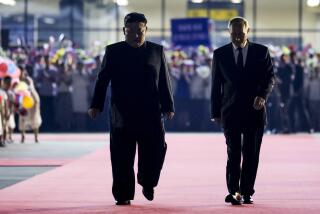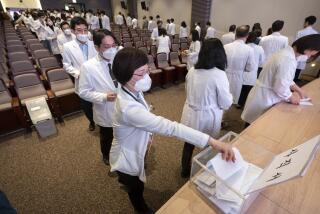North Korea’s healthcare is a horror, report says
- Share via
Reporting from Beijing — North Korea’s healthcare system is unable to provide sterilized needles, clean water, food and medicine, and patients are forced to undergo agonizing surgery without anesthesia, Amnesty International reported.
North Korea’s healthcare system is unable to provide sterilized needles, clean water, food and medicine, and patients are forced to undergo agonizing surgery without anesthesia, Amnesty International reported Thursday.
The human rights group, citing World Health Organization statistics, found that North Korea spent under $1 per capita on healthcare, the lowest in the world. The global average was $716 per capita.
The collapse of the healthcare system compounds the misery of a population that is chronically malnourished and suffering from digestive problems caused by eating weeds, tree bark, roots, corn husks, cobs and other “substitute” foods.
The poor diet also weakens the immune system, making people susceptible to diseases such as tuberculosis, which afflicts at least 5% of the population, according to the report. Meanwhile, about 45% of children under the age of 5 suffer stunted growth because of malnutrition.
“In view of the enormity of the food crisis in North Korea, health issues cannot be separated from the food insecurity that has gripped the country for almost two decades,” the report stated. “The people of North Korea suffer significant deprivation in their enjoyment of the right to adequate healthcare, in large part due to failed or counterproductive government policies.”
Amnesty International interviewed 40 people who had escaped North Korea, most of them from 2004 to 2009. They told harrowing stories about their experiences in the medical system.
“I was screaming so much from the pain, I thought I was going to die. They had tied my hands and legs to prevent me from moving,” said a 56-year-old woman from Musan who had an appendectomy performed without anesthesia.
In keeping with its socialist ideology, North Korea once boasted of providing free, universal healthcare with a network of more than 44,000 general practitioners who would even make house calls. Although hospitalization remains free, the facilities are unsanitary and have no food, bandages or medicine.
“Hospitals in North Korea no longer have medicines. Medical personnel don’t receive any, or if they do, they sell them in the market,” said a 47-year-old man interviewed by Amnesty International who also described paying a doctor treating his son for tuberculosis with 10 packs of cigarettes.
Others told of providing bottles of liquor or cooked meals to the doctors, who themselves were receiving almost no salary.
The Amnesty International report was consistent with the description of North Korea in Times stories on the east coast city of Chongjin in 2005. A doctor, Kim Ji Eun, said then that her patients had to bring their own bottles if they needed intravenous fluid. Beer bottles were preferred.
“If they would bring in one beer bottle, they’d get one IV. If they’d bring two bottles, they would get two,” said the doctor, who defected in 1998 and lives in South Korea.
More recent defectors say there has been no improvement in the healthcare situation.
A 17-year-old girl from Musan, a city near the Chinese border, who defected in February of this year said people often used illegal drugs, particularly “ice,” a highly addictive methamphetamine that is manufactured inside North Korea.
“You do drugs if you have a cold, a stomachache, for whatever is wrong,” said the girl, who was interviewed in March by The Times. The Amnesty International report also said North Koreans were using morphine and opium derivatives to medicate themselves for lack of proper pharmaceuticals.
North Korea went through a famine in the 1990s that killed about 2 million people. Following a gradual improvement after 2000, the food situation has again deteriorated as a result of botched economic policies and continued international isolation.
More to Read
Sign up for Essential California
The most important California stories and recommendations in your inbox every morning.
You may occasionally receive promotional content from the Los Angeles Times.













